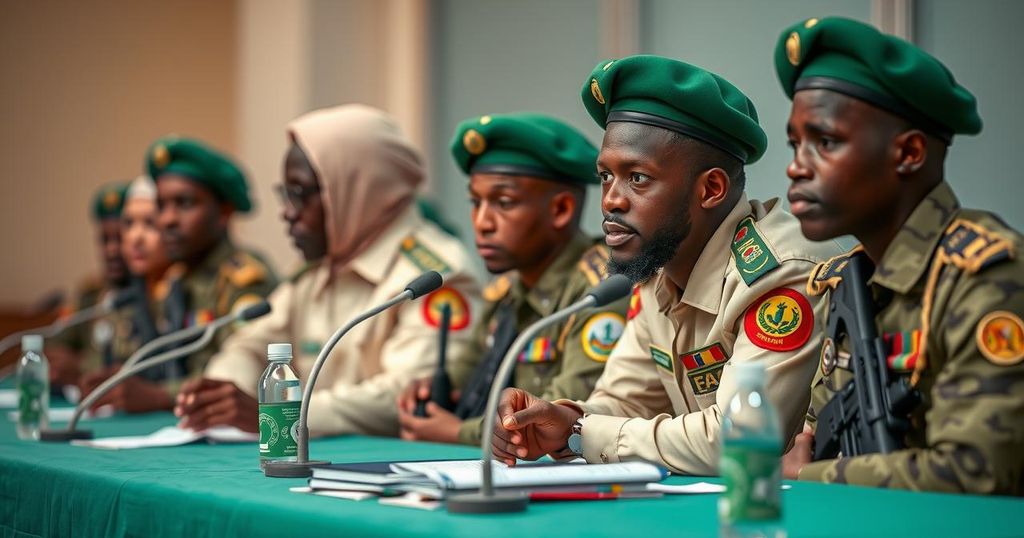The UAE has assured U.S. lawmakers it will not supply weapons to Sudan’s paramilitaries, leading to the suspension of efforts to block a $1.2 billion arms deal. U.S. officials plan to monitor adherence to these commitments, highlighting the critical need for accountability amid Sudan’s ongoing civil war.
The United Arab Emirates (UAE) has assured the United States that it has ceased supplying weapons to Sudan’s paramilitary forces amidst ongoing scrutiny surrounding its role in the brutal civil conflict in Sudan. U.S. lawmakers, after receiving these assurances, indicated they would lift their efforts to block a significant arms deal valued at $1.2 billion with the UAE. Senator Chris Van Hollen shared a letter from the White House, detailing UAE commitments regarding its relationship with Sudan’s Rapid Support Forces (RSF). According to the letter, signed by Brett McGurk, the White House coordinator for Middle East policy, the UAE has stated it is not transferring weapons to the RSF, nor will it in the future. Furthermore, McGurk has committed to evaluating the reliability of these claims by mid-January.
Van Hollen emphasized the intent to use arms sales as leverage to mitigate the severe violence in Sudan, noting that he may once again seek to block military sales should the UAE fail to uphold its promise. Representative Sara Jacobs, who also worked towards suspending arms sales in Congress, expressed her intention to closely observe the UAE’s compliance. She remarked that the lack of UAE support would hinder the RSF’s military capabilities, potentially creating a more conducive environment for negotiations and ceasefire discussions.
The UAE has consistently denied allegations of supporting the RSF, which has been engaged in deadly conflicts with the Sudanese army, resulting in significant casualties and displacing millions since April 2023. Accusations of the UAE providing weapons to the RSF, albeit through Chad, were deemed credible by United Nations experts involved in monitoring the arms embargo on the Darfur region. This situation plays into the broader context of U.S. arms sales to the UAE, which have faced increased scrutiny following the Biden Administration’s promise of enhanced oversight when it took office after the Trump Administration’s more lenient policies regarding weapon sales, including advanced fighter jets and armed drones under a previous agreement connected to Israel.
The UAE’s recent assurances appear to be a strategic move to address U.S. concerns as it navigates its military partnerships amid geopolitical tensions in the region, demonstrating the complex play between arms sales, compliance with international humanitarian norms, and the quest for peace in conflict zones.
The situation in Sudan has escalated significantly due to internal conflict, particularly involving the Rapid Support Forces (RSF) and the Sudanese military. The violence commenced in April 2023, resulting in tens of thousands of deaths and displacing over 11 million people, creating a dire humanitarian crisis. The U.S. government’s role has included holding foreign entities accountable for their arms transfers, particularly if those transfers exacerbate violence in conflict regions. The UAE, as a major player in the Gulf region, has come under scrutiny for its military actions and partnerships, especially following credible claims that it funneled arms to the RSF. The backdrop of U.S.-UAE weapons agreements adds further complexity, particularly with changing administrations and their foreign policy approaches.
In summary, the UAE’s commitment to halt arms supplies to Sudan’s paramilitary forces may represent a significant shift in its foreign policy amidst international concern over the escalating violence in Sudan. The assurances provided to U.S. lawmakers have resulted in the suspension of efforts to block a substantial military sales deal. However, U.S. officials have indicated they will continue to monitor the situation closely, emphasizing the importance of accountability in arms transactions to foster peace in regions plagued by conflict.
Original Source: www.france24.com






